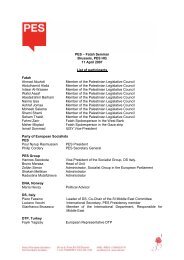Hedge funds and Private Equity - PES
Hedge funds and Private Equity - PES
Hedge funds and Private Equity - PES
You also want an ePaper? Increase the reach of your titles
YUMPU automatically turns print PDFs into web optimized ePapers that Google loves.
146<br />
6. Coherence, co-responsibility <strong>and</strong> ethics<br />
Our welfare societies in Europe <strong>and</strong> our social market economy have for a century been built<br />
on a certain feeling of coherence, justice <strong>and</strong> shared responsibility. Our tax systems, public<br />
sector services, social policies, universal education etc. are based on that shared responsibility.<br />
Throughout the years the different actors have accepted this balanced interest including the<br />
social partners <strong>and</strong> their collective bargaining on the labour market.<br />
6.1 Manager remuneration – coherence <strong>and</strong> justice<br />
The relationship between LBO <strong>funds</strong> <strong>and</strong> incumbent management is a contradictory one, the<br />
nature of which can vary greatly depending on the attitudes of both sides, the attachment of<br />
management to the existing structures of the firms (including established systems of collective<br />
bargaining, worker participation, etc.) <strong>and</strong> the dependence of the fund on their specialised knowledge<br />
etc. In the worst cases the buyout firm enters into an unholy alliance with management:<br />
managers are enticed with a share of the spoils (stock options etc.) to participate in the looting<br />
of the firm by the fund. In others they are compensated for acquiescing to the takeover with<br />
generous – in some cases sc<strong>and</strong>alous – golden h<strong>and</strong>shakes. If their specialised technical or<br />
firm-specific know-how gives incumbent management a strong h<strong>and</strong>, the fund has to offer<br />
generous inducements for management to change its mode of operation. If not they may simply<br />
be replaced overnight (<strong>and</strong> can thus be expected to be interested in cooperating with employee<br />
representatives <strong>and</strong> other stakeholders in blocking takeovers). Of course, in genuine rescue <strong>and</strong><br />
restructuring cases, the fund may be the mechanism by which the firm is able to shed incompetent<br />
management or disinterested <strong>and</strong> untalented owners.<br />
The shareholder value approach, originating in the USA, has been spreading vigorously in the<br />
European economy. It follows the unilateral alignment of companies with the interests of shareholders<br />
who have their sights on the greatest possible increase in value of their company shares<br />
<strong>and</strong> the highest possible dividends. The private-equity industry consistently follows the shareholder<br />
value model. Such <strong>funds</strong> frequently replace the management if the latter does not actively<br />
support their goals. PE <strong>funds</strong> use a differentiated incentive scheme in order to induce management<br />
to adopt their short-term goals of increasing the value of the enterprise <strong>and</strong> freeing up<br />
liquidity including premiums, share options, participation in the enterprise, performance-based<br />
pay <strong>and</strong> bonuses for meeting PE-fund targets. For managers this can mean a significant increase<br />
in their income. For the company <strong>and</strong> its employees, this often has a detrimental effect.<br />
Managers take greater risks that can produce excesses, such as falsifying balance sheets or<br />
backdating share options. Managers even change their attitude towards staff. According to statements<br />
made by the works councils, managerial obligations towards financial investors, incentive<br />
systems <strong>and</strong> shorter office hours, as an alternative to firing employees, create a purely numbersbased<br />
approach that takes less account of the practical operational business, as well as inducing<br />
a cold social climate <strong>and</strong> indifference towards the company <strong>and</strong> its staff.<br />
Enterprises being run exclusively according to economic success indicators are becoming the<br />
norm, while management increasingly loses touch with actual production <strong>and</strong> the people involved<br />
in the target enterprise. What is remarkable is the increasing frequency with which takeovers are<br />
becoming more aggressive. Enterprises are increasingly being regarded as mere financial products<br />
<strong>and</strong> shareholders are becoming share traders. Sustainability <strong>and</strong> viability are losing their<br />
importance in the development of enterprises. Short-termism in business strategies is constantly<br />
on the rise.




